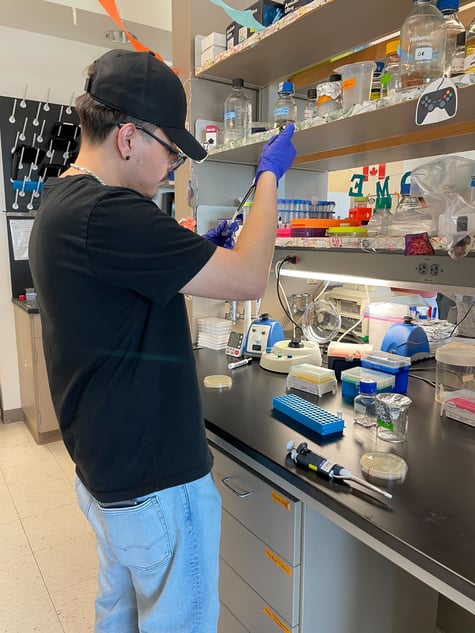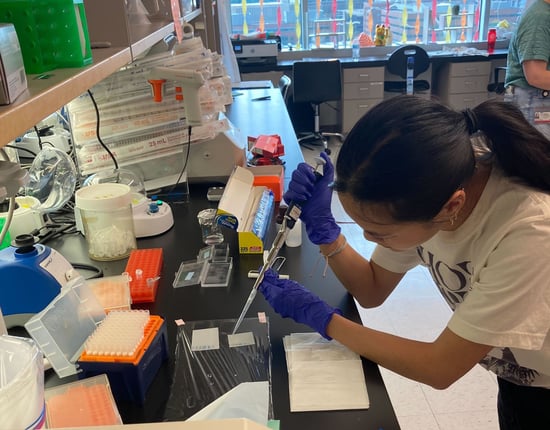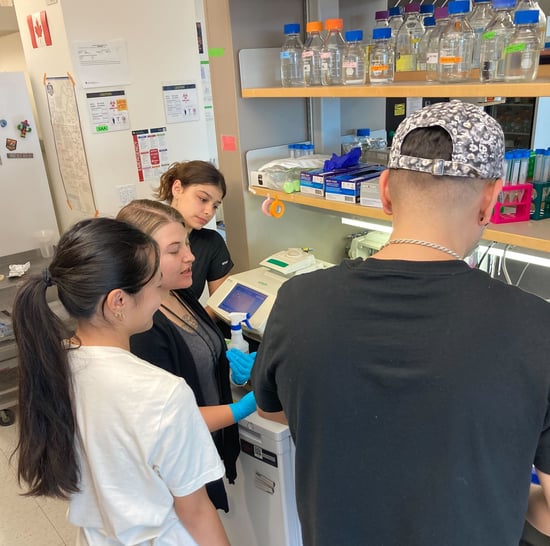Olivia Rissland, PhD, is seeing her research through different eyes these days.
As one of the founders and facilitators of the MSU/Anschutz Program for Meaningful Undergraduate Research Experiences (MAP Scholars), Rissland, associate professor in the Department of Biochemistry and Molecular Genetics at the University of Colorado School of Medicine, has found herself reinspired by the undergraduate students from Metropolitan State University of Denver whom the program brings to campus to learn about research.
“They’re doing these things that we think are just standard, everyday things, but when they do it for the first time, it’s so exciting for them,” she says. “You forget about the cool parts, the parts that were exciting when you first started. It gets lost in the day to day. Having somebody experience it for the first time and seeing them realize how cool it is that we’re looking at molecules in cells — it brings huge energy to a lab.”

Metro State intern Edgar Provencio.
Inventing opportunities
MAP Scholars was born in 2019, when Rissland and Srinivas Ramachandran, PhD, assistant professor of biochemistry and molecular genetics and CU Cancer Center member, learned more about Metro State, a public university in downtown Denver where more than 50% of the student body are students of color. The program began accepting applications in 2020 and welcomed its first cohort of 12 students in 2021. Undergraduates come to campus for a summer, then stay on longer if they like the experience.
“Metro has really great students, but they don’t have as many research opportunities,” Rissland says. “It’s a commuter college, and a lot of the students are working jobs that are not on their career path. We thought this would be a really great way of helping them get exposed to research, but also bringing some more undergraduates onto the campus, which could help with recruitment for our graduate programs.”
The students are assigned to labs led by CU School of Medicine researchers and placed on one of two tracks — a general track, which teaches freshmen and sophomores the basics of lab research, and a research track for juniors and seniors with some research experience who want to get more involved with specific research projects.

Mia Harris, a research intern from Metro State.
“A huge thing for many of the students is that they don’t always understand that these paths are available to them,” Rissland says. “These students are incredibly talented, they're hardworking, they're smart, but because a lot of them come from nontraditional backgrounds, they don't see themselves in a lab. For freshmen and sophomores, our hope is that just being in that environment might help them think, ‘Oh yeah, I could do this. These people are no different than me.’ With the juniors and seniors, we want them to be able to have some ownership of the project.”
Transformative experience
One of the Metro students who joined the program in its first cohort is Erica Sterling, who graduated in May and just joined Rissland’s lab as a full-time professional research assistant.
For Sterling, the experience transformed her original goal of going into medicine into being a biomedical researcher.
“I started on this whole endeavor because I was interested in medical school, but then I realized how cool it is to be the first person to see new research and data,” she says. “I also love the troubleshooting aspects. When things don’t work, I find it really fascinating to problem solve and figure out how to make it work. My family always jokes that I’m a professional student, but that’s kind of what a researcher really is. They’re professional at learning new things.”

Professional research assistant and former Metro State intern Erica Sterling, center, works with current interns Mia Harris, Sarah Rones, and Edgar Provencio.
Playing for the home team
For Ramachandran, the MAP Scholars program also is a way for the CU School of Medicine to serve and attract students from backgrounds traditionally underrepresented in medicine — the students who make up a large part of the population at Metro State, as well as in the Aurora neighborhoods that surround the CU Anschutz Medical Campus.
“We have a very talented undergraduate population in Denver, but we are not really tapping into that talent,” Ramachandran says. “When we look at the PhD applications to our university, it's almost like you have a great college basketball team, but then your NBA team is all players from far away. By targeting local students, we are trying to balance that out and give people an opportunity they really deserve but don’t know it exists.”
Students can take science classes at Metro, he says, but doing research on the CU Anschutz campus helps bring that classwork to life.
“More than one student has told me that through the internship experience, they understood what their college courses were trying to teach them,” he says. “They can take a molecular biology class at Metro, but then when they come to the lab and do PCR or cloning, they say, ‘Oh, this is what my professors are trying to teach me.’ They have to work through the intellectual exercise of designing the experiment and interpreting the results.”
Building a toolkit
Rissland has been gratified to see the interest from researchers in the Department of Biochemistry and Molecular Genetics in having undergraduates help out with their research — and equally gratified to see the interest from Metro State students who otherwise may not have had the opportunity to explore careers in medical science.
“To have people understand, ‘What does it mean to be a scientist? What does it mean to look at the world as a scientist does? How does that influence how you think about things, even in your day-to-day life?’” Rissland says. “To give people those tools is hugely rewarding.”
Featured photo: Sarah Rones, an intern from Metro State, conducts research in Rissland's lab.



